It may have occurred to regular readers and those who listened to “Records in Review” on CJRT that I am enamored by Schoenberg’s Verklärte Nacht, written in 1899 for string sextet. The composer made his final arrangement in 1943 for string orchestra. Schoenberg wrote it in just three weeks when smitten by his teacher’s sister, Mathilde von Zemlinsky, and motivated by Richard Dehmel’s melodramatic poem. He married Mathilde and Verklärte Nacht became his most popular opus.
Naïve has produced “La Collection Naïve ... sixteen rare and precious jewels waiting to be discovered or revisited.” Verklärte Nacht played by the Arditti Quartet is one of them.
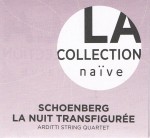 The Arditti string quartet, founded in 1974, specializes in contemporary music. Over the years there have been exits and entries in the personnel, and for this 1993 recording there were violinists Irvine Arditti and David Alberman, violist Garth Knox and cellist Rohan de Saram plus Thomas Kakusa, violin, and Valentin Erben, cello (Naïve NC 40022). Their version is completely new to me and this re-issue is a first hearing. It is cast in the mould set by the Hollywood String Quartet in 1950, which was, I believe, the very first recording of the sextet. Schoenberg stated that the music “does not illustrate any action or drama but was restricted to portray nature and to express human emotions.” His notes for the Hollywood recording conclude ... “It should not be forgotten that this work, at its first performance in Vienna, was hissed and caused riots and fist fights. But it soon became very successful.” The very fine Hollywood performance borders on the passionate, and that differs from many of the subsequent readings from other groups that strive for a harmonious approach. However, it wasn’t until I heard the Arditti disc that it became clear that the Hollywood Quartet did not go far enough in articulating the raw emotional conflicts and the final resolution. The Arditti’s is a thrilling, sinuous performance, fervent and intense, unlike any other of which I am aware. The passionate conflicts between the woman and man overflow as all six musicians vehemently climb the top of their “voice.” The recording is first rate and the dynamics are thrilling. Lasting less than 28 minutes, a CD of only one work may seem pretentious but in this case it’s a very good buy. The work could easily pass for absolute music and many will hear it this way without regard to the inspiration.
The Arditti string quartet, founded in 1974, specializes in contemporary music. Over the years there have been exits and entries in the personnel, and for this 1993 recording there were violinists Irvine Arditti and David Alberman, violist Garth Knox and cellist Rohan de Saram plus Thomas Kakusa, violin, and Valentin Erben, cello (Naïve NC 40022). Their version is completely new to me and this re-issue is a first hearing. It is cast in the mould set by the Hollywood String Quartet in 1950, which was, I believe, the very first recording of the sextet. Schoenberg stated that the music “does not illustrate any action or drama but was restricted to portray nature and to express human emotions.” His notes for the Hollywood recording conclude ... “It should not be forgotten that this work, at its first performance in Vienna, was hissed and caused riots and fist fights. But it soon became very successful.” The very fine Hollywood performance borders on the passionate, and that differs from many of the subsequent readings from other groups that strive for a harmonious approach. However, it wasn’t until I heard the Arditti disc that it became clear that the Hollywood Quartet did not go far enough in articulating the raw emotional conflicts and the final resolution. The Arditti’s is a thrilling, sinuous performance, fervent and intense, unlike any other of which I am aware. The passionate conflicts between the woman and man overflow as all six musicians vehemently climb the top of their “voice.” The recording is first rate and the dynamics are thrilling. Lasting less than 28 minutes, a CD of only one work may seem pretentious but in this case it’s a very good buy. The work could easily pass for absolute music and many will hear it this way without regard to the inspiration.
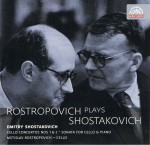 Supraphon has released an irresistible 2-CD set entitled Rostropovich plays Shostakovich that is self-recommending (SU 4101-2). In 1958 Shostakovich, reviewing a Rostropovich concert, wrote in Pravda, “I am overpowered by the artist’s authoritativeness. He is always convinced of the correctness of his opinion, which he expresses with such zealousness that it is impossible not to believe him.” With Rostropovich in mind he wrote the First Cello Concerto. There are two performances here, both live; the world premiere recording, from Moscow on October 6, 1959, conducted by Aleksandr Gauk and from the following May in Prague with the Czech Philharmonic conducted by Kirill Kondrashin. The premiere performance is carefully played and amply virtuosic from all concerned but some eight months later the audience heard a stirring performance, refreshingly played with irresistible enthusiasm. In the Second Cello Concerto (1966) the conductor is Yevgeny Svetlanov from a concert in Prague on December 11, 1967. Of the two cello concertos, I do prefer the second. It is a contemplative work that presages much of what the composer would express in his later works right up to the 15th Symphony. No quibbles about this performance. Lastly Rostropovich, with the composer at the piano, plays the lyrical Cello Sonata, Op.40 (1934) recorded in 1959. Rostropovich later recorded this sonata accompanied by Benjamin Britten in 1964 but that must take second place to this one. Shostakovich plays Shostakovich! The recordings are all mono which is of little consequence as the sound is crystal clear with a front to back perspective.
Supraphon has released an irresistible 2-CD set entitled Rostropovich plays Shostakovich that is self-recommending (SU 4101-2). In 1958 Shostakovich, reviewing a Rostropovich concert, wrote in Pravda, “I am overpowered by the artist’s authoritativeness. He is always convinced of the correctness of his opinion, which he expresses with such zealousness that it is impossible not to believe him.” With Rostropovich in mind he wrote the First Cello Concerto. There are two performances here, both live; the world premiere recording, from Moscow on October 6, 1959, conducted by Aleksandr Gauk and from the following May in Prague with the Czech Philharmonic conducted by Kirill Kondrashin. The premiere performance is carefully played and amply virtuosic from all concerned but some eight months later the audience heard a stirring performance, refreshingly played with irresistible enthusiasm. In the Second Cello Concerto (1966) the conductor is Yevgeny Svetlanov from a concert in Prague on December 11, 1967. Of the two cello concertos, I do prefer the second. It is a contemplative work that presages much of what the composer would express in his later works right up to the 15th Symphony. No quibbles about this performance. Lastly Rostropovich, with the composer at the piano, plays the lyrical Cello Sonata, Op.40 (1934) recorded in 1959. Rostropovich later recorded this sonata accompanied by Benjamin Britten in 1964 but that must take second place to this one. Shostakovich plays Shostakovich! The recordings are all mono which is of little consequence as the sound is crystal clear with a front to back perspective.
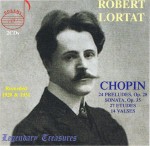 Robert Lortat? Have you ever heard of him? Today, very few have. Lortat (1885–1938) was a French pianist, renowned for his interpretation of Chopin and who made one of the very first recordings of any Chopin in 1904. He was a very successful concert pianist in his youth. The reason for his obscurity was chronic ill-health, the memento of a poison gas attack while serving in the French army in WWI. This severely curtailed his concertizing and he turned mostly to teaching and, as it happened, to recording. As one of the most respected interpreters of his generation, the Columbia Graphophone Company (later Columbia Records) invited him to record the music of Chopin. Lortat recorded the Waltzes, Etudes, Preludes and the Second Sonata. These recordings were so successful that Columbia issued them in five continents. Unfortunately, Lortat did not complete the Chopin project, nor continue with any other recordings. It is likely that with the wide availability of his recordings in these late years of the 78rpm era that the leading pianists of the day heard them. It would not be at all fanciful to believe that pianists of Dinu Lipatti’s time were influenced by Lortat’s interpretations. A new release from DOREMI (DHR-7994/5, 2CDs) contains all these recordings. Lortat plays with ease and authority, arguably more appealing than Cortot with the advantage of being virtually note-perfect. This set is a real find, both welcome and necessary, reintroducing these cornerstones of the modern French school of piano playing. These recordings from the 1920s and early 30s are a credit to engineers in Paris. Now faultlessly restored and most certainly belying their vintage, they are easy on the ears and listening to these performances was a great pleasure. A well-merited release.
Robert Lortat? Have you ever heard of him? Today, very few have. Lortat (1885–1938) was a French pianist, renowned for his interpretation of Chopin and who made one of the very first recordings of any Chopin in 1904. He was a very successful concert pianist in his youth. The reason for his obscurity was chronic ill-health, the memento of a poison gas attack while serving in the French army in WWI. This severely curtailed his concertizing and he turned mostly to teaching and, as it happened, to recording. As one of the most respected interpreters of his generation, the Columbia Graphophone Company (later Columbia Records) invited him to record the music of Chopin. Lortat recorded the Waltzes, Etudes, Preludes and the Second Sonata. These recordings were so successful that Columbia issued them in five continents. Unfortunately, Lortat did not complete the Chopin project, nor continue with any other recordings. It is likely that with the wide availability of his recordings in these late years of the 78rpm era that the leading pianists of the day heard them. It would not be at all fanciful to believe that pianists of Dinu Lipatti’s time were influenced by Lortat’s interpretations. A new release from DOREMI (DHR-7994/5, 2CDs) contains all these recordings. Lortat plays with ease and authority, arguably more appealing than Cortot with the advantage of being virtually note-perfect. This set is a real find, both welcome and necessary, reintroducing these cornerstones of the modern French school of piano playing. These recordings from the 1920s and early 30s are a credit to engineers in Paris. Now faultlessly restored and most certainly belying their vintage, they are easy on the ears and listening to these performances was a great pleasure. A well-merited release.
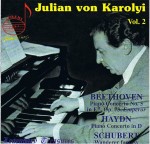 Doremi has issued Volume Two of Julian von Karolyi, the Hungarian-German pianist who enjoyed tremendous success for his Liszt, Rachmaninoff, Chopin and other Romantic composers. Volume I featured Tchaikovsky, Schumann and Liszt. On this new CD (DHR-8009) Karolyi plays the Emperor Concerto with Robert Heger conducting (1958); the Haydn Piano Concerto in D, Hob.XIII/11 with Richard Schumacher conducting (1967) and Schubert’s Wanderer Fantasy (1958). As in the first volume, the unanimity between soloist and orchestra, particularly in the Haydn that sparkles and is laced with humour, makes this a very attractive offering. The sound, by the way, is exemplary.
Doremi has issued Volume Two of Julian von Karolyi, the Hungarian-German pianist who enjoyed tremendous success for his Liszt, Rachmaninoff, Chopin and other Romantic composers. Volume I featured Tchaikovsky, Schumann and Liszt. On this new CD (DHR-8009) Karolyi plays the Emperor Concerto with Robert Heger conducting (1958); the Haydn Piano Concerto in D, Hob.XIII/11 with Richard Schumacher conducting (1967) and Schubert’s Wanderer Fantasy (1958). As in the first volume, the unanimity between soloist and orchestra, particularly in the Haydn that sparkles and is laced with humour, makes this a very attractive offering. The sound, by the way, is exemplary.
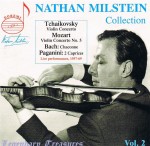 Nathan Milstein was one of the greatest violinists of the 20th century, along with Heifetz, Oistrakh, Menuhin and Francescatti, all of whom had long, illustrious careers. Milstein’s attributes were his pure, unaffected stylistic approach and violin technique that was breathtaking, athletic and secure. He came to North America in 1929 as did Horowitz and Piatigorsky, with whom he had played trios earlier. As with many artists, Milstein’s live performances had an extra sizzle. Listening to a new CD from Doremi (DHR-7752) makes this point. We hear the Tchaikovsky Violin Concerto, from Paris in 1969 with Jean Martinon conducting; Mozart Violin Concerto No.5, K219 in 1961 with Carl Schuricht conducting, along with Bach’s Chaconne and three Paganini Caprices from 1957, all from Ascona, Switzerland. Another disc for the fans presented in fine sound.
Nathan Milstein was one of the greatest violinists of the 20th century, along with Heifetz, Oistrakh, Menuhin and Francescatti, all of whom had long, illustrious careers. Milstein’s attributes were his pure, unaffected stylistic approach and violin technique that was breathtaking, athletic and secure. He came to North America in 1929 as did Horowitz and Piatigorsky, with whom he had played trios earlier. As with many artists, Milstein’s live performances had an extra sizzle. Listening to a new CD from Doremi (DHR-7752) makes this point. We hear the Tchaikovsky Violin Concerto, from Paris in 1969 with Jean Martinon conducting; Mozart Violin Concerto No.5, K219 in 1961 with Carl Schuricht conducting, along with Bach’s Chaconne and three Paganini Caprices from 1957, all from Ascona, Switzerland. Another disc for the fans presented in fine sound.



